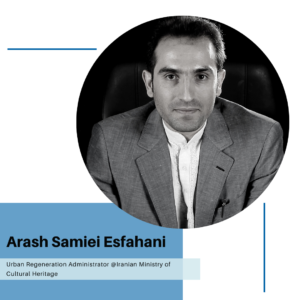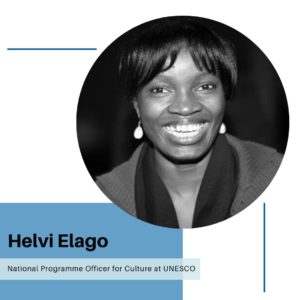Living in quarantine: the journal
COVID-19 has upended life as we know it. These anxious and unusual times bring unforeseen difficulties that make us feel disruption and uncertainty. But it’s also times like these when we need one another most, to share thoughts and experiences in order to successfully cope in this crisis.
Members and partners of the HERITΛGE share with us aspects of their everyday lives, concerns about the present, aspirations about the future.
What is the situation in your country after the onset of Covid-19?
Like other countries all around the world, the circumstances are not quite perfect for Iran. On the one hand, communities are working hard to protect their revenues. While the government is trying to save the economy and keeping society health. But the key point here is that COVID-19 has entered into Iran in the period that we were finding new ways to reduce the destructive impacts of sanctions and trade restrictions.It can’t be said that the side-effects of this pandemic have had little impact on our cities.
But in comparison to some countries which are not in our sanctions, we are doing much more better. We have done good acts to level the shock of this crisis into society. Although next to governmental effective performances the major part of this achievement goes back to NGOs and benevolent individuals participations.
In a general view shutting down and semi-open of medium and small scale businesses are the most challengeable impact on my own country. Although, almost all educational and training institutions like schools and universities or gyms got closed too. Moreover, transportation restrictions have had another influence on the routine conditions in the
country.
It had been hoped that with quite intelligently working on own natural, human and cultural resources we could open new opportunities for compensation resulted from lack of permission of exporting oil and gas. Consequently, we were planning to tackle obstacles for all travelers and further investment in the tourism industry.
How do you think it will affect the heritage organizations and practices in the future?
As much as the heritage management affairs are run by the government in Iran it is assumed that this pandemic won’t make a drastic change in the main structure of the ministry of (MCTH). However, it is not far away from the mind that facing this situation may lead to opening the gates for outsourcing some activities and privatizing some clusters and sectors.
Most important changes might appear in the tourism department. It is predicted that the national policymaking might be turned out to provincial policymaking, especially for summer vacations. For domestic journeys those provinces that are secured seems that they are allowed to receive guests. Although they should follow healthy instructions and
protocols. In this term, the government will take more the role of observant in the provinces and devolve its implementation missions to private sectors hereafter.
In respect of all other departments of MCTH, decreasing the income share of internal and abroad travels will cause the reduction of the executive and research projects budgets. It is supposed to create some innovative solutions to replace missed financial sources.
In this case maintenance of world heritage sites, restoration of prominent monuments and structures, various handicrafts workshops and corresponded jobs, most of the archaeological excavations and most of the anthropological research projects will be reorganized after supplying new resources.
What will be your next steps?
Unfortunately, the state of the economy is falling to another slope after increasing the second wave of the pandemic. Besides, the sanctions alongside this matter are going to make a massive pressure on those people who are directly and indirectly dependent on cultural heritage for their subsistence.
Preparing financial backup frameworks for all clusters of heritage affairs, supporting handicraftsmen using technology for making more facilitation in trading their artworks, analyzing database in order to predict probable hypothesis on the needs of each heritage site for protecting and conserving them, simplifying all allowance issuing procedures for
creating new related businesses, establishing e-learning campaigns, accelerating and incubating start-up ideas and making new strategies for supplying finances for research projects are the logical priorities of tackling the consequences of the pandemic.
How do you experience it individually and how does the organization you work for deals with it?
As an urban regeneration vice-chancellor working in one of the municipalities of Iran, I imagine that urban heritage is suffering from this situation too but less than other kinds of heritage. They are extremely under control of municipalities while are being used by people less than the past.
Being in this position has made a golden capacity for reviewing them as cultural resources and getting ready for making new strategies for proposing some creative ideas in order to achieve urban regeneration targets. Besides, stuck into trouble in social and economic dimensions have made this possible for claiming to attract the covering budgets from
GNGOs, FBOs and associations. Even in some cases, this chance is available to make the contemporary bills as necessary demands to issues of new regulations and rules.
All in all, despite all concerning threats on heritage field I personally feel this pandemic as the opportunity in terms of heritage management. I believe that notwithstanding all suffer that people are bearing, hope is still alive and people could cross over this situation alongside together.
What is the situation in your country after the onset of Covid-19?
Bologna is in lockdown and implementing social distancing. Only essential production is active. The economy is plummeting.
How do you experience it individually and how does the organization you work for deals with it?
My social life is reduced to online interaction. The agency I work for allows to work full time from home.
How do you think it will affect the heritage organizations and practices in the future?
Heritage institutions are now closed to the public and heritage consultancies are stuck. As long as mobility is limited, heritage organisations will have to find new ways of engaging the public and sustain themselves. Digital and virtual seem to be the new paths, but are they?
What will be your next steps?
Reflect on how to make heritage relevant to people in the changed scenario through new heritage interpretation practices.
What is the situation in your country after the onset of Covid-19?
Like all over the world with social distancing, state borders are closed in Queensland, people are working from home, record government subsidies, etc.
How do you experience it individually and how does the organization you work for deals with it?
My family can’t visit to see my newborn due in a few weeks. But professionally we are still working in the office since there are no cases of Covid-19 in our region.
How do you think it will affect the heritage organizations and practices in the future?
Financially for sure, but I think all will turn back to normal if they are able to survive with subsidies.
What will be your next steps?
Staying in, and trying to stay connected with family friends, and professionally via virtual means.
What is the situation in your country after the onset of Covid-19?
The situation in India is like that of being in top of a nuclear reactor. They took measures in time but given the population and the access to decent quality of healthcare, things could go for a toss if the spread occurs.
How do you experience it individually and how does the organization you work for deals with it?
This lockdown has hit my organization, Access For ALL, hard as our primary work is inclusion, tactile experiences, participatory activities and bringing people together, which has suddenly become a taboo. Individually, I am doing fine as this is a time to take things slow, learn new things, deal with ambiguity of life and since I teach, I have been conducting online classes.
How do you think it will affect the heritage organizations and practices in the future?
First of all, it will surely impact tourism which in-directly affects the upkeep of the the heritage sites and monuments. For some sites it actually good as per conservation perspective that they are having less or as of now no people. And I believe that this will affect the jobs of some people. For consulting organizations, it is pushing them to see how can they explore things digitally. So it is a little different and difficult phase, which I am sure shall pass soon.
Second and positive thought is that we are writing history, we are somehow going to be part of a timeline that will be seen as archive for artists, inspiration for writers and stories for those who survive it. So great time to document this milestone of time.
What will be your next steps?
Personally I’m working on safeguarding myself and seeking basic financial planning for at least a year. This is my top priority. Then we are collaborating with various organizations to offer free, as well as paid sessions on mental health, arts based engagement and learning for those with special needs. We are urging museums to explore digital accessibility. Let’s see what’s in store for us in future. It’s like a war, each day is a new day! I hope that we all win this war hale and hearty!
What is the situation in your country after the onset of COVID-19?
Τhe country boarders in Namibia are closed and two regions popular with tourism were on lock down until 16th April. Up to today only 16 cases reported and 3 have recovered and no deaths.
How do you experience it individually and how does the organization you work for deals with it?
Personally, it is very isolating because I can’t see friends and loved ones. I try to exercise everyday before I start my day and do my hobbies, which is craft, during my free time. At work, we are teleworking because we had put a Business continuity plan in place already in February. We are having a lot of Skype meetings and emails exchange.
How do you think it will affect the heritage organizations and practices in the future?
Heritage Institutions like museums, galleries, craft centres and heritage sites are closed leading to financial and job loss. There is need for massive promotion domestic tourism. Because even if the boarders open, internationally will take a while to pick up but nationally people might want to go outside their home for some adventure.
What will be your next steps?
We will work with the Ministry of Cultures and other partners on how to prepare the heritage sector for such crisis.
Joshua Mwankunda, Manager at Ngorongoro Conservation Area Authority
“We have very few cases of COVID-19 and only one death in Tanzania, so there is no panic whatsoever about the pandemic. What is the profound effect is tourism. Normally we would have a lot of tourists this year and we would be expecting revenues equal to 70 million USD. Unfortunately, this means that we will have to have direct support from the government and friends of Conservation for the loss of income in order to support the basic activities of protection and conservation.”





